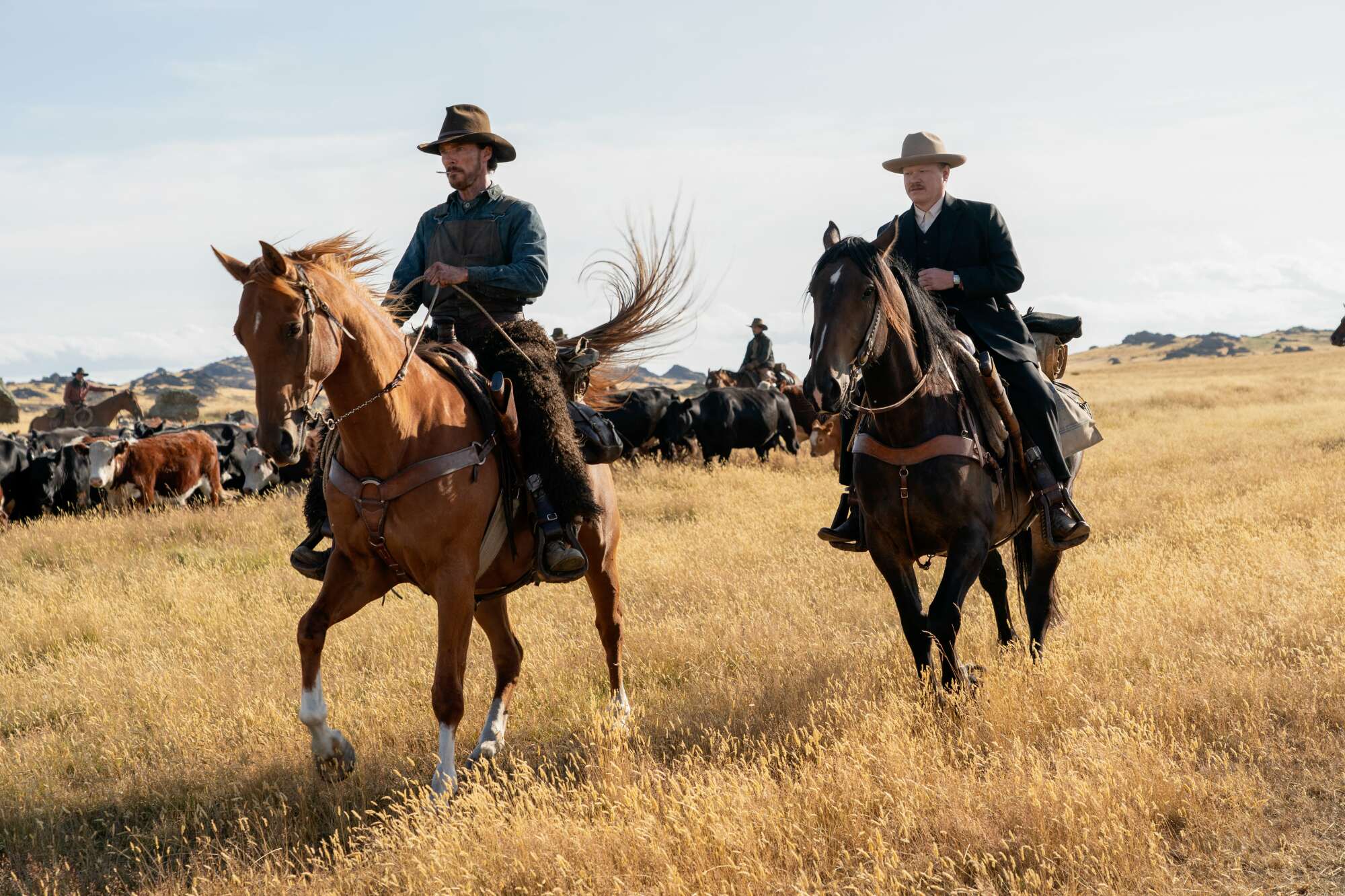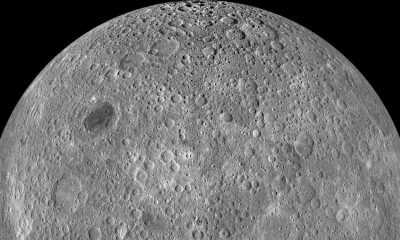Business
Benedict Cumberbatch crushes Jane Campion’s ‘The Power of the Dog.’

When you think “rugged American cowboy,” the image that pops to mind probably isn’t of Benedict Cumberbatch. Though the English actor has played a wide array of roles — from Doctor Strange to Alan Turing and Sherlock Holmes — there’s frequently a common thread of posh intellectualism therein. When Cumberbatch strides into Jane Campion’s new Western, The Power of the Dog, wearing buffalo-skin chaps and a battered cowboy hat, it’s jarring. His stern expression and snarling American West accent can’t hide those aristocratic cheekbones or the intelligent glimmer in his eye. Yet as this fascinating film unfolds, it becomes clear why Cumberbatch’s casting was a stroke of brilliance from Campion.
The acclaimed writer/director adapts The Power of the Dog from Thomas Savage’s 1967 novel. Cumberbatch stars as Phil Burbank, a surly rancher who shares a house, business, and life with his timid brother George (Jesse Plemons), who he has nicknamed “Fatso.” As you might guess, Phil is casual in his cruelty, which is plainly displayed when a cattle drive through 1925 Montana brings the brothers into the inn of fragile “suicide widow” Rose Gordon (Kirsten Dunst). There, the snarking cowpoke is quick to mock her son Peter (Kodi Smith-McPhee) for perceived softness, spitting slurs and harshly mimicking of the boy’s lisp. With a simple insert shot, Campion’s use of visual language poetically exhibits the threat Phil poses to this civilized setting. The petals of a delicate paper flower, which Peter has made for decoration, are invaded by Phil’s rough, filthy fingers. It’s one of many examples of a collision of decorum and dominance, femininity and masculinity, peace and war. It’s a conflict unfurling slowly but unstoppably.

Credit: Netflix
Part of the joy of watching The Power of the Dog for the first time is the uncertainty of where it might go. Once George marries Rose, it’s clear Phil’s behavior will grow more menacing toward mother and son. But Campion is a master of slow-burn tension that feeds on character development. So, your focus may not be as fixated on what comes next as much as the present, where a single silent gesture of kindness can change a family, and a sly suggestion can cause carnage. The first watch feels like a rapturous trek through rugged but gorgeous terrain, where there’s so much to take in that you might not realize where you’re headed. Once you know the destination though, that second watch is magic. All of a sudden, you can see all the breadcrumbs that Campion had subtly dropped along the way. They were always there, buried among the beauty but laced with poison.
Part of the joy of watching ‘The Power of the Dog’ for the first time is the uncertainty of where it might go.
Cumberbatch’s casting comes into play in these revelations. Sure, he’s played villains before and has a deliciously sharp delivery for insults. Even with a walk sturdy and square, he looks too willowy and too pretty to smoothly fit into an American Western. This is by design. At first, a chaotically vicious tyrant, Phil Burbank’s secrets are laid raw in the sun as he bathes in a river, curls up in a fecund barn with a polished saddle, and surprises himself by daring to let someone in. Despite his posse of hooting ranch hands, his cocksure attitude, and his gruff exterior, Phil is playing a role, performing what he thinks a man should be. As he grows closer to a new friend, the cracks in this facade begin to show. Then, Cumberbatch standing out makes sense, as his performance slides from chilling to unnervingly vulnerable.

Credit: Netflix
However, the tensions of his interactions wouldn’t be near as powerful were it not for a supporting cast that can keep pace. With genteel gestures and a shy smile, Plemons provides a stark contrast to Phil’s toxic masculinity. Tidy where Phil is grungy, soft where he is hard, George aspires to a peaceful home life with flourishes of luxury, like elaborate cocktails, fancy dinner parties, and indoor plumbing. Peter is a more new-fangled type of American man, as he relishes solitude for crafting and reading, and is deeply devoted to his mother. Where Geoge is plump and Phil is muscular, Peter looks like a scarecrow, his pants clinging closely to his long thin legs, then blossoming into dress shirts that turn his torso into a cloud that might well drift away from this rough ranch. This contrast is enhanced by Smit-McPhee’s nuanced performance, which lives in moments of silent reaction and observation. While Phil will gnaw on a monologue for dominance, the wide-eyed stare of this boy becomes a startling rebuttal.
Then, there’s Kirsten Dunst. In the hands of a lesser filmmaker, Rose might have been a one-note character, defined by her pitifulness in the face of Phil’s bullying. But Campion has built beats into their scenes that make clear Rose’s struggle to live up to the role of happy wife/mother/mistress of the house/sister. A trembling smile slowly falls into a devastated frown. A twinkle in the eye shifts from tender to terrified. Her physicality transforms from self-assured to stuttering, as her every step, every word, every breath is steadily undermined by a malicious man who revels in her pain. Even the film’s score gives voice to their cold war. In Rose’s scenes, a trembling piano plays, reflecting a personal embarrassment endured before the instrument. For much of the film, Johnny Greenwood’s score sings with strings that sound like yowlings winds, hungry to run down any fool that dare face them. Yet the best bit of musical menace is Cumberbatch’s low, slow whistle, a refrain that signals Phil is near and listening. It’s a threat that slinks through the house, across the plains, and under our skin.

Credit: Netflix
The menace threaded through the film mesmerizes. Ari Wegner’s searching cinematography weaves this mood into an aching vulnerability. His tightest close-ups grapple with their subjects, refusing to be shut out from the most secret emotions. His long shots linger, inviting us to take in the gorgeous but hostile environments that surround this fraught family, and illustrate how frail they are by contrast. In all of this, Campion creates a dance of fractured souls, all broken by savage loneliness. Even at their worsts, she holds a dogged empathy for her heroes and villains, who cower and bite with passion.
It’s even better the second time around.
In the end, it’s a twisted thrill to see how The Power of the Dog turns out. But trust me when I tell you, it’s even better the second time around. That’s when the layers of Cumberbatch’s performance can be recognized beyond the snarling bravado. That’s when the script and its strolling pace can truly be treasured. That’s when the true genius of Jane Campion shines even brighter.
The Power of the Dog opens in theaters in limited release Nov. 17 and on Netflix on Dec. 1.
-

 Entertainment7 days ago
Entertainment7 days agoWhat’s on the far side of the moon? Not darkness.
-

 Business6 days ago
Business6 days agoTikTok faces a ban in the US, Tesla profits drop and healthcare data leaks
-

 Business6 days ago
Business6 days agoLondon’s first defense tech hackathon brings Ukraine war closer to the city’s startups
-

 Entertainment7 days ago
Entertainment7 days agoHow to watch ‘The Idea of You’: Release date, streaming deals
-

 Entertainment6 days ago
Entertainment6 days agoMark Zuckerberg has found a new sense of style. Why?
-

 Business5 days ago
Business5 days agoHumanoid robots are learning to fall well
-

 Entertainment5 days ago
Entertainment5 days ago2024 summer TV preview: 33 TV shows to watch this summer
-

 Business4 days ago
Business4 days agoGoogle Gemini: Everything you need to know about the new generative AI platform






















